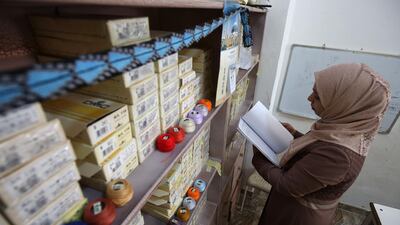The Covid-19 pandemic has deepened the plight of informal workers, refugees, youth and women who were already among the most vulnerable groups in Arab states' labour markets, a regional International Labour Organisation official said.
The health crisis has worsened pre-existing inequalities, aggravated the suffering of vulnerable groups and highlighted the need for further economic diversification, Tariq Haq, the ILO's senior employment policy specialist, told The National.
"When you look at labour markets, the region is full of segmentation. Countries in conflict were extremely vulnerable before the crisis and the pandemic is compounding their suffering and economic pressures, making the situation even worse and less sustainable than ever before," he said.
The ILO projected that Arab countries will end this year with the equivalent of one million fewer full-time jobs, or a reduction in working hours of 2.9 per cent, compared to pre-crisis levels, according to its latest global update. In 2020, the total estimated decline in working hours in 2020 was 9 per cent, or the equivalent of 5 million full-time jobs.
Under the United Nations agency's most optimistic assumptions, Arab states will still see a 1.3 per cent decline in working hours in 2021. In a pessimistic scenario, working hours will decline by 3.8 per cent or the equivalent to 2 million full-time jobs.
The region's wealthier nations with stable social protections, access to Covid-19 vaccines and resources to handle infection flare-ups without imposing stringent restrictions, will most likely veer towards the baseline and optimistic scenarios, Mr Haq said.
Countries embroiled in conflict or where healthcare systems fail to keep up with the rates of infection could move towards stricter lockdowns and therefore see greater losses in working hours compared to wealthier nations or those better equipped to manage the number of cases, he said.
"Lebanon is a case in point," the ILO official said. The country has been roiled by a financial and political crisis, and is reeling from the aftermath of Beirut port explosion, lockdown measures and a labour market that was already in shambles prior to the pandemic.
Overall, it is difficult to predict which of the outcomes from the three labour scenarios will materialise in 2021 given the high uncertainty due to the new virus mutations and rate of vaccine distribution.
"This is a heterogenous region, we have the least developed countries in conflict to some of the highest-income countries in the world," Mr Haq said. "The reality is you will see a big mix."
Among groups made even more vulnerable by the pandemic are workers engaged in informal employment, without contracts or social protection, as they have less access to formal support schemes during the crisis, Mr Haq said.
The pandemic has also negatively impacted the region's youth, who have been struggling with high unemployment rates.
"Pre-Covid our youth unemployment rate was amongst the highest in the world," he said. "Young people have struggled to find jobs in our region for a long time."
Refugees also face a potentially greater proliferation of the virus and lack of adherence to social distancing or other safety measures in crowded spaces.
The ILO official said that as the region emerges from the Covid-19 crisis, policymakers should seek newer models where macro-economics, trade and investment are geared towards developing high-productivity and high value-add sectors that can absorb the region's young people.
"What this region suffered prior to the pandemic was a lack of diversification within economies: it was consumption-oriented, there was a lack of structural transformation and labour demand was relatively low," Mr Haq said. "What this crisis has brought to bear is the fault lines in existing structures, which will not be sustainable."
Expansion of social protection systems across the region and more social dialogue between workers and businesses is critical, he said.
Last week, the ILO said a global recovery in working hours and incomes this year will be slow, uneven and uncertain.
The tentative signs of a labour market recovery come after the pandemic shut workplaces, forced many to work from home, hit incomes, led to job losses and pushed millions into poverty.
“Covid-19 has resulted in the most severe crisis for the world of work since the Great Depression of the 1930s,” the UN agency said.


